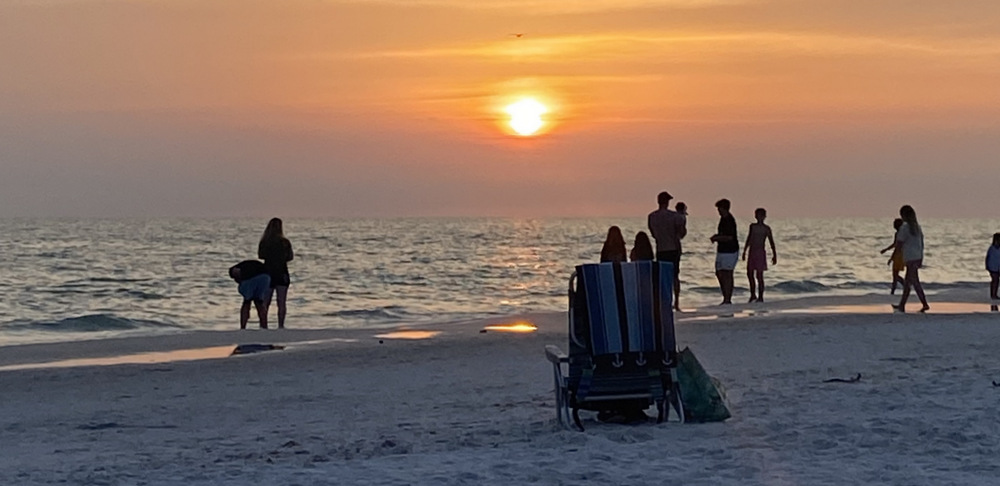A short break from caregiving was good for my mental health
Relaxing in the Florida sunshine was just the respite I needed
Written by |

Last week for spring break, I traveled with my son from snowy Michigan to sunny Florida. Siesta Key was just as beautiful as I remembered from 15 years ago when my husband, Todd, and I vacationed there with our two small children, along with Todd’s parents and my brother who was living there.
We rented a condo and spent time on the beach with its soft, white, powdery sand, and my brother and I went parasailing. Todd had a weak left arm, so he stayed on the ground with our 4-year-old daughter and 9-month-old son.
At the time, Todd’s weak arm was concerning, but we never imagined it would turn out to be something that would devastate our lives. A couple months later, he was diagnosed with ALS and given a prognosis of two to five years.
Todd somehow survived that prognosis, but his ALS is now too progressed for him to leave our home for a brief outing, much less travel to Florida. Our daughter, who’s at college, had spring break a few weeks earlier, so just my son and I flew south while a team of family members, volunteers, and paid caregivers took care of Todd.
I texted Todd a photo of the sun setting over the gulf waters.

The sun sets over Siesta Key, Florida. (Photo by Kristin Neva)
He replied with photos from long ago from that same beach and asked me to re-create a pose of me and my son on a beach blanket.
After texting the re-created photo to Todd, I received a call from my mom, who was helping with his care. She gave me an update and informed me that a blizzard was complicating the caregiving schedule. The road conditions would make it difficult for the nighttime caregiver to come in at the beginning of her shift at 11 p.m., and it was questionable if the morning caregiver would be able to get out of her driveway in the morning.
My anxiety started to rise as it usually does when there’s a hiccup in the schedule, but I turned my gaze to the ocean. I watched the waves roll in and out. There was nothing I could do from 1,400 miles away. Besides, Todd encouraged me to go precisely because I needed a break from dealing with the stress of those types of situations. They’d figure it out.
I listened to the sound of the waves and watched a man reel in a fish.
Later, Todd texted that he’d found somebody to work that night who would arrive earlier while the roads were still passable and stay later until the morning caregiver relieved her.
I breathed a sigh of relief, and then I enjoyed a few days of relaxation. I had time to recharge in the sun without being on duty.
We spent some time with my brother, who still lives in Florida today. We hiked, saw alligators, and spent time on the beach. I collected shells and a bag of sand to take home. And then we spent a couple days with Todd’s sister, brother-in-law, and mother, who now lives there. We visited the Edison and Ford Winter Estates and I went parasailing with my son.
After four days of sunshine, we said goodbye to family and flew back to Michigan.
We got in the night before a weekend of snow and ice storms and caregiver cancellations. And then — because life with ALS never stops throwing challenges our way — the tilt and recline functions on Todd’s wheelchair broke, making life even more difficult.
A glass bowl filled with Siesta Key sand and seashells sits on my dining room table. I’m trying to hold on to a little bit of Florida sunshine in the midst of winter as I resume snow removal and the challenges of life with ALS.
Note: ALS News Today is strictly a news and information website about the disease. It does not provide medical advice, diagnosis, or treatment. This content is not intended to be a substitute for professional medical advice, diagnosis, or treatment. Always seek the advice of your physician or other qualified health provider with any questions you may have regarding a medical condition. Never disregard professional medical advice or delay in seeking it because of something you have read on this website. The opinions expressed in this column are not those of ALS News Today or its parent company, Bionews, and are intended to spark discussion about issues pertaining to ALS.






Leave a comment
Fill in the required fields to post. Your email address will not be published.